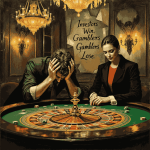Unravelling the Mystery: What Is Mass Hysteria and its Impact
April 18, 2025
Mass hysteria isn’t madness in the margins—it’s a full-scale override of collective cognition. It’s when fear metastasises into group identity. Rational thought? Exiled. Individual judgment? Surrendered. From the Salem Witch Trials to the mass fainting episodes in medieval convents, to the stampedes for toilet paper in 2020, mass hysteria is the parasite that feeds on shared emotion and spits out irrational consensus.
This isn’t just about witches or pandemics. It’s about feedback loops, system-wide contagion, and the architecture of collective vulnerability. The stock market? Same animal, different skin. Panic selling, asset implosions, bear raids—they’re not financial anomalies; they’re psychological chain reactions triggered by crowd emotion moving at digital speed.
Dr. Robert Bartholomew refers to these moments as “reflections of the era’s dominant anxieties.” In one century it’s demons. In another, debt. Today, it’s inflation, AI, contagion, and collapse. The underlying mechanism hasn’t changed—only the dress code.
Dr. Gary Small identifies the accelerant: mass media, misinformation, and social feeds with little friction. The faster fear travels, the more precise the collapse. In the COVID age, a single tweet could move markets. During banking panics? One whisper emptied vaults.
The Fed tries to play god with liquidity injections and moral hazard theatrics. But sometimes, they throw gasoline on the fire, mistaking it for water. Rate cuts misread as desperation. QE is framed as a betrayal of the bailout. When public trust evaporates, policy doesn’t stabilise—it distorts.
Notice the ploy here; to do that which the masses abhor, one has to create a situation that distracts their attention. Then offer a solution three times as damaging as the previous one, and in their desperation to seek safety, they will agree to whatever course of action is laid out. Tactical Investor March 25, 2020
The ploy isn’t accidental—it’s engineered. Crisis justifies control. Mass hysteria becomes the battering ram for policy shifts no one would accept under normal conditions.
When the herd begs for stability, they’ll accept any leash handed to them, even if it’s wrapped in barbed wire.
Preserving Your Investment Portfolio: Shielding Against the Destructive Impact of Panic
The system will be flooded with so much liquidity that the markets will melt upward when the media reports the data more accurately. Right now, they talk about the mortality rate without breaking the data down and informing the masses that older individuals are the ones who fall into the high-risk category. Even then, most of them appear to have some other complications already.
Updated mortality rate by age group

Notice how mild it is for those under 50, but let’s assume it’s 1.3%. No data is provided on whether these individuals had any existing conditions. So far, they are using stats to manipulate the data to suit whatever outcome they want to project onto the masses. A more robust approach (which would be relatively straightforward) would entail listing any other conditions the patient may have had before becoming infected.
Furthermore, the overall death rate is relatively low when considering data from countries with robust health systems. Look at Japan, Germany, Denmark, South Korea, Switzerland, Singapore, and Taiwan, among others. The total death rate is well below 1.5 and, in many cases, below one per cent, and that’s accounting for all age groups. For example, Singapore has zero deaths, Taiwan only has one, and so on.
An Alternate Reality or a Distorted Reflection of Our World
The media is presenting theories without all the data, and if you read almost all the stories, you will see experts using words such as ‘may,’ ‘could,’ and ‘might,’ but the masses treat these opinions as facts. Try to Google the term “Is the Coronavirus from the same family as the flu virus?”
You won’t find any articles directly answering the question in the top 10 search results. Instead, you will find a plethora of pieces that go on to describe how dangerous the new variant of the Coronavirus is. These articles were there before, but now they have been pushed to the bottom pages,where no one bothers to look at them.
Narratives are created on the Fly.
The answer is straightforward: yes, it belongs to the same family, but it exhibits a more potent strain. Despite scouring through six pages of search results on Google, I struggled to find a concise explanation solely focusing on the coronavirus’s relation to influenza. Only when I turned to DuckDuckGo.com did I discover valuable information on the first page. However, I had to scroll down the article to uncover the following details:
According to the CDC, human coronaviruses are relatively common worldwide. There are seven different types, with many of them causing common colds, as explained by infectious disease expert Amesh A. Adalja, M.D., senior scholar at the Johns Hopkins Centre for Health Security. However, two more recent types, namely MERS-Cov and SARS-Cov, can potentially cause severe illnesses. http://bit.ly/2UeuVL5
So, why can’t the most popular search engine provide an article in the top 10 results that directly answers the question? The answer is that high-ranking media sites often publish many opinion-based articles, replacing articles from lower-ranking sites that would have addressed the question. Most individuals will not sift through data pages looking for the answer; they stop at the first page and usually look at the top results.
The Danger of Mass Hysteria in Investing
This hysteria-based sell-off is producing one of the most significant buying opportunities in decades; more on that later.
The short-term technical analysis cannot identify support levels because we are dealing with madness, so we added the new standard to the anxiety index. What exacerbates the situation is that there is very little liquidity; consider the bid and ask prices for some options. They are unreal, for example, an offer of 1.40 and an ask of 5.00. This allows a few large players to influence the markets in any direction.
Factors That Can Help Stabilise the Situation
- The Fed throws the kitchen sink at this market, unveiling a vast Stimulus package.
- The press starts to report the news accurately; all they have to do is visit worldmeters.info to get a better understanding of what is happening.
- A new rapid detection test has been announced.
- The US has implemented concrete measures to test a large number of individuals rapidly. This would be seen as good news because the average death rate is 1.39%, considering all groups. This is significantly lower than in China and many other nations.
- A vaccine works in clinical trials. The FDA is going to approve the use of this vaccine extremely quickly. However, data has to show that it works even with minor problems.
- A treatment that has a 90% cure rate.,
Rational Investing: Staying Calm Amid Mass Hysteria
When you add in the stupidity and ineptitude of the elected officials, what should have been a mild situation turns into a nightmare-type scenario. We are supposedly the most advanced nation on earth, but after the current debacle, one would be hard-pressed to call the US progressive, at least in the medical arena.
We know that a vaccine and a better treatment will be found; it is just a matter of time. As for the press and politicians acting sensibly, that’s a hard call.

This chart from the 1940s clearly illustrates that every so-called crash has proved to be a buying opportunity, and in the long run, bears are always killed, but the same cannot be said of bulls. Hence, when the trend is up, as it is currently, every strong correction must be viewed through a bullish lens.
Mass Hysteria is A Contrarian Investor’s Best Friend
Still, the long-term outlook is given, as this crash started on a note of uncertainty, unlike every previous market crash.
“the time to buy is when there’s blood in the streets.” Baron Rothschild
Losing your head in a crisis is a good way to become a crisis. – C.J. Redwine
Sooner or later comes a crisis in our affairs, and how we meet it determines our future happiness and success. Since the beginning of time, every form of life has been called upon to meet such a crisis. – Robert Collier
Successful people recognise crisis as a time for change – from lesser to greater, smaller to bigger. – Edwin Louis Cole
It’s not always easy to do what’s unpopular, but that’s where you make money. Buy stocks that look bad to less careful investors and hang on until their real value is recognised. I’ve never bought a stock unless, in my view, it was on sale. Buy on the cannons and sell on the trumpets. John Neff
To win as a contrarian, you need the right timing and have to take a position in the appropriate size. If you do it too small, it’s not meaningful. If you do it too big, you can get wiped out if your timing is slightly off. The process requires courage, commitment and an understanding of your psychology Michael Steinhardt
Mass Hysteria: More Quotes From Great Minds
I will tell you how to become rich…Be fearful when others are greedy. Be greedy when others are fearful. Warren Buffett
To succeed as a contrarian, you must recognize what the crowd believes, have concrete justification for why the majority is wrong, and have the patience and conviction to stick with what is, by definition, an unpopular bet. Whitney Tilson
Humans are prone to herd because it is always warmer and safer in the middle of the herd. Indeed, our brains are wired to make us social animals. We feel the pain of social exclusion in the same parts of the brain where we feel real physical pain. So being a contrarian is a little bit like having your arm broken regularly. James Montier
Many give advice, but few that offer guidance. Anonymous
Our all-time favourite
To buy when others are despondently selling and to sell when others are euphorically buying takes the greatest courage but provides the greatest profit. Bull markets are born in pessimism, grow on scepticism, mature on optimism and die on euphoria. The time of maximum pessimism is the best time to buy, and the time of maximum optimism is the best time to sell. If you want to have a better performance than the crowd, you must do things differently from the crowd. Sir John Templeton
Insight into the Future: A Look at the Stock Market’s Outlook
We have moved deeper into the madness zone, and neutral sentiment has dropped to levels not seen for years. It is currently trading at 13, but bullish sentiment, although below its historical average, remains relatively high; it would be ideal to drop below 24. Bearish sentiment continues to trend higher, and that’s a good sign. As things stand now, we are close to another “mother of all buy signals” that would match 1987 and 2008. Our indicators need to dip slightly lower into the oversold range.
Our trend indicator is positive, suggesting that every mild to wild pullback should be viewed as an opportunity.
Originally disseminated on March 25, 2020, this piece remains in a state of perpetual refinement, with the most recent update made in April 2025.















